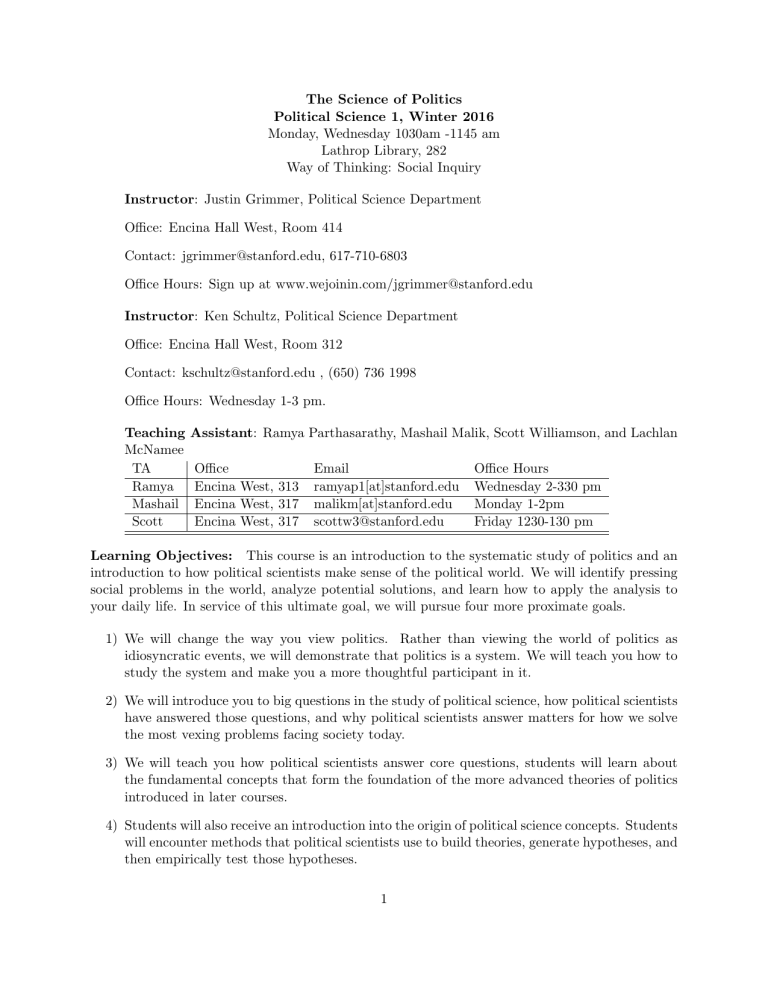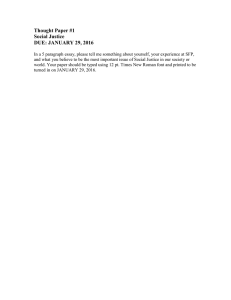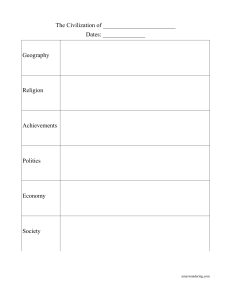
The Science of Politics Political Science 1, Winter 2016 Monday, Wednesday 1030am -1145 am Lathrop Library, 282 Way of Thinking: Social Inquiry Instructor: Justin Grimmer, Political Science Department Office: Encina Hall West, Room 414 Contact: jgrimmer@stanford.edu, 617-710-6803 Office Hours: Sign up at www.wejoinin.com/jgrimmer@stanford.edu Instructor: Ken Schultz, Political Science Department Office: Encina Hall West, Room 312 Contact: kschultz@stanford.edu , (650) 736 1998 Office Hours: Wednesday 1-3 pm. Teaching McNamee TA Ramya Mashail Scott Assistant: Ramya Parthasarathy, Mashail Malik, Scott Williamson, and Lachlan Office Encina West, 313 Encina West, 317 Encina West, 317 Email ramyap1[at]stanford.edu malikm[at]stanford.edu scottw3@stanford.edu Office Hours Wednesday 2-330 pm Monday 1-2pm Friday 1230-130 pm Learning Objectives: This course is an introduction to the systematic study of politics and an introduction to how political scientists make sense of the political world. We will identify pressing social problems in the world, analyze potential solutions, and learn how to apply the analysis to your daily life. In service of this ultimate goal, we will pursue four more proximate goals. 1) We will change the way you view politics. Rather than viewing the world of politics as idiosyncratic events, we will demonstrate that politics is a system. We will teach you how to study the system and make you a more thoughtful participant in it. 2) We will introduce you to big questions in the study of political science, how political scientists have answered those questions, and why political scientists answer matters for how we solve the most vexing problems facing society today. 3) We will teach you how political scientists answer core questions, students will learn about the fundamental concepts that form the foundation of the more advanced theories of politics introduced in later courses. 4) Students will also receive an introduction into the origin of political science concepts. Students will encounter methods that political scientists use to build theories, generate hypotheses, and then empirically test those hypotheses. 1 Prerequisites There are no prerequisites Evaluation There are four components to your final grade. 1) 30% : Writing assignments. Over the quarter you will complete four short (3-4 pages) writing assignments. Each writing assignment will give you the opportunity to practice a different style of writing. Practicing different styles of writing will be useful for completing both your academic work and later in your career after college. The essays will cover the following four subject areas: Assignment 1: Evaluating and arbitrating a dispute between competing arguments - Essay Topic Distributed: 1/11/2016 - Essay Due: 1/27/2016 Assignment 2: Explaining a “puzzle” in political decision making - Essay Topic Distributed: 1/27/2016 - Essay Due: 2/10/2016 Assignment 3: Evaluating an argument using original data analysis - Essay Topic Distributed: 2/10/2016 - Essay Due: 2/29/2016 Assignment 4: Provide a policy brief with recommendations on how to address a major problem - Essay Topic Distributed: 2/29/2016 - Essay Due: 3/9/2016 We will provide you with specifics on the topic and length of the papers in class. Format your paper as a Microsoft Word document and send it as an attachment named after yourself, using your last name, followed by your first name, followed by the response paper number, e.g. SchultzKenPaper1.docx for your first response paper and SchultzKen2.docx for your second response paper. Paste the text of the paper into the body of the email, as well, as insurance in case the attachment does not go through. Late response papers will not be accepted. - 25%: Midterm Exam - 35%: Final Exam. Thursday, March 17, 1215-315. - 10%: Section Participation. Our class integrates active learning within the course. In class we will use examples, simulations, and interactive scenarios to provide insights into the major problems we address in 2 the course. The only way to completely learn the material is to attend class. Students who regularly attend and participate will receive the highest participation grades. If you miss a section, you will receive credit as if you participated in that section if and only if: (1) you missed the section for reasons beyond your control, i.e. illness, scheduled athletic event, or family emergency; (2) you notify your TA prior to the scheduled section or demonstrate why advance notification was impossible; and (3) you write a one-page commentary on the readings for that section and submit it electronically to your TA by 11:00 a.m. on the Monday following the section you missed. The one-page commentary will count as your participation for the week. Students with Disabilities Students who may need an academic accommodation based on the impact of a disability must initiate the request with the Office of Accessible Education (OAE). Professional staff will evaluate the request with required documentation, recommend reasonable accommodations, and prepare an Accommodation Letter for faculty dated in the current quarter in which the request is being made. Students should contact the OAE as soon as possible since timely notice is needed to coordinate accommodations. The OAE is located at 563 Salvatierra Walk (phone: 723-1066, URL: http://studentaffairs.stanford.edu/oae). Required Readings There is no required text for the course. We will assign articles for each course meeting Class Outline Unit 1: How Do We Govern Ourselves? 1/4, Introduction: The Science of Politics and the Purpose of Government - Noonan, Peggy. “Monday Morning Blog Entry”. http://on.wsj.com/1NKXdDf - Silver, Nate. “Nov. 5. Late Poll Gains for Obama Leave Romney with Longer Odds”. http://nyti.ms/1PscqK3 1/6, The Power of the Median? - Congleton, Roger. 2002. “The Median Voter Model”. http://rdc1.net/forthcoming/ medianvt.pdf - Frank, Thomas. 2004. “Failure Is Not An Option, It’s Mandatory” in New York Times 1/11, How We Choose Representatives and Why it Matters - Benoit, Kenneth, 2006. “Duverger’s Law and the Study of Electoral Systems”. French Politics. 4, 1. 69-83 - Lijphart, Arend, 2012. “Electoral Systems: Majority and Plurality Methods Versus Proportional Representation”. Chapter 8 in Patterns of Democracy: Government Forms and Performance in Thirty-Six Countries 3 - McCarty, Nolan. 2012. “Hate Our Polarized Politics? Why You Can’t Blame Gerrymandering”. in Washington Post http://wapo.st/1davdLp - Challenge Reading: Tufte, Edward R. 1973. “The Relationship Between Seats and Votes in Two-Party Systems”. American Political Science Review. 67, 2. 540-554 1/13, Holding Elected Officials Accountable - - Mayhew, David R.1974. “Congressional Elections: The Case of the Vanishing Marginals”. Polity. 6, 3. 295-317. - Sides, John and Lynn Vavreck. 2013. “The Hand You’re Dealt” in The Gamble: Choice and Chance in the 2012 Presidential Election. Princeton University Press - Healy, Andrew J., Neil Malhotra, and Cecilia Hyunjung Mo. 2010. “Irrelevant Events Affect Voters’ Evaluations of Government Performance”. Proceeedings in the National Academy of Science. 107, 29. 12804-12809. 1/18. No meeting, MLK Day 1/20, The Corrupting Power of Money? - Bonica, Adam, Nolan McCarty and Howard Rosenthal. 2013. Why Hasnt Democracy Slowed Rising Inequality. Journal of Economic Perspectives. 27,3. 103-124 - Ansolabehere, Stephen, John M de Figueiredo and James M Snyder Jr. 2003. “Why Is There so Little Money in U.S. Politics?” Journal of Economic Perspectives. 17, 1. 105-130. 1/25, Autocracy: Representation and Accountability without Elections - Miller, Michael K. 2015. “The Surprising Benefits of Autocratic Elections”. in Washington Post. - Haber, Stephen. 2008. “Authoratarian Government”. in The Oxford Handbook of Political Economy. - Olson, Mancur. 1993. “Dictatorship, Democracy, and Development” American Political Science Review. 87,3. 567-576 Unit 2: The Environment 1/27, Public Opinion and Environmental Policy - Hardin, Garrett. 1968. “The Tragedy of the Commons”. Science 162, no. 3859. 1243-1248 - Bruce Stokes, Richard Wike, and Jill Carle. 2015. Global Concern about Climate Change, Broad Support for Limiting Emissions, PewResearch Center: Global Attitudes and Trends, November 5. - Challenge Article Bolsen, Toby, James N. Druckman, and Fay Lomax Cook. 2015. “Citizens’, Scientists’, and Policy Advisors’ Beliefs about Global Warming.” Annals of the American Academy of Political and Social Science 658 (March). 27195 4 2/1, The Role of Corporations and NGOs - Dalton, Russell J., Steve Recchia, and Robert Rohrschneider. 2003. “The Environmental Movement and the Modes of Political Action.” Comparative Political Studies 36(7): 74371. - Kamieniecki, Sheldon. 2006. Corporate America and Environmental Policy: How Often Does Business Get Its Way? Stanford University Press pp. ixx, 34, 913, 5459, 25053. 2/3, International Cooperation on the Environment - Sprinz, Detlef and Tapani Vaahtoranta. 1994. “The Interest-Based Explanation of International Environmental Policy.” International Organization 48,1: 77105. - Keohane, Robert and David G. Victor. 2013. “The Transnational Politics of Energy.” Daedelus 142(1): 97109. - Bechtel, Michael M. and Kenneth F. Scheve. 2013. “Mass Support for Global Climate Agreements Depends on Institutional Design.” Proceedings of the National Academy Science 110(34): 137638 2/8: Midterm Unit 3: War 2/10, The Puzzle of War - David A. Lake. 2010. “Two Cheers for Bargaining Theory: Assessing Rationalist Explanations of the Iraq War,” International Security 35, no. 3 752. - Gordon, Michael R. and Bernard E. Trainor. 2006. “Even as US Invaded, Hussein Saw Iraqi Unrest as Top Threat” in The New York Times. 2/15, No Class, President’s Day 2/17, The Role of International Organizations - Erik Voeten. 2005. “The Political Origins of the UN Security Councils Ability to Legitimize the Use of Force”, International Organization 59(3): 527-57. - Virginia Page Fortna. 2004. “Does Peacekeeping Keep Peace? International Intervention and the Duration of Peace After Civil War” International Studies Quarterly 48: 269-92. 2/22, Is Interstate war becoming obsolete? - Mueller, John. 2009. “War Has Almost Ceased to Exist: An Assessment.” Political Science Quarterly 124(2): 297321. - Steven Pinker, “The Decline of War and Conceptions of Human Nature.” International Studies Review 15, 3. 400-405. - Russett, Bruce. 1993. “The Fact of Democratic Peace” in Grasping the Democratic Peace Princeton University Press. 323 5 2/24, Civil War - James D. Fearon and David D. Laitin. 2003. “Ethnicity, insurgency, and civil war” American Political Science Review 97 (February): 75-90. - Marc Lynch, ed. 2013. The Political Science of Syrias Civil War. Project on Middle East Political Science, chapters by James Fearon, David Cunningham, Barbara Walter, and Thomas Hegghammer, and any others that interest you. 2/29 Terrorism - Robert Pape. 2003. “The Strategic Logic of Suicide Terrorism” American Political Science Review 97 (August): 343-61. - Alan Krueger and Jitka Maleckova. 2003 “Education, Poverty, and Terrorism: Is there a Causal Connection?” Journal of Economic Perspectives 17 (Fall): 119-44. Unit 4: Poverty, Inequality, and the Problem of Redistribution 3/2, Why Are Some Countries Rich and Other Countries Poor? (Part 1: Bad Luck) - Sachs, Jeffrey D., Andrew D. Mellinger and John L. Gallup. 2001. The Geography of Poverty and Wealth, Scientific American 284,3. 7075. - Collier, Paul. 2007. The Natural Resource Trap and Landlocked with Bad Neighbors in The Bottom Billion: Why the Poorest Countries Are Failing and What Can Be Done About It Oxford University Press 3852, 5363 - Engerman, Stanley L. and Kenneth L. Sokoloff. 2005. Colonialism, Inequality, and LongRun Paths of Development National Bureau of Economic Research Working Paper Series No. 11057. - Challenge Reading: Haber, Stephen and Victor Menaldo. 2011. “Do Natural Resources Fuel Authorianism: A Reappraisal of the Resource Curse”. American Political Science Review 105, 1. 1-26. 3/7, Why Are Some Countries Rich and Other Countries Poor? (Part 2: Bad Policy) - Acemoglu, Daron. 2003. Root Causes, Finance & Development 2730. - Easterly, William. 2001. “Governments Can Kill Growth” and “Polarized Peoples” in The Elusive Quest for Growth: Economists’ Adventures and Misadventures in the Tropics. MIT Press 217-239, 255-281. - Challenge Reading: Acemoglu, Daron, Simon Johnson, and James A. Robinson. 2001. “The Colonial Origins of Comparative Economic Development: An Empirical Investigation”. American Economic Review. 91, 5. 1369-1401. 6 3/9, Why are there poor people in rich countries? - Hacker, Jacob S. and Paul Pierson. 2010. “Winner-Take-All Politics: Public Policy, Political Organization, and the Precipitous Rise of Top Incomes in the United States”. Politics & Society 38, 152-204. - Fox, Cybelle. 2004. “The Changing Color of Welfare? How Whites’ Attitudes toward Latinos Influence Support for Welfare” American Journal of Sociology 110, 3. 580-625. 7




